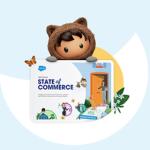The challenges created by a growing digital skills gap aren’t going to go away by themselves. In fact, our latest Global Digital Skills Index highlights just how pressing it is for all of us to take a fresh look at how we can approach the issue. Currently, employers and employees are facing something of a conundrum. Digital transformation is happening at such speed that ‘time served’ isn’t always a good measure of competency, yet businesses traditionally look for new candidates who have several years of experience in their field. Meanwhile, there’s an upcoming pipeline of talented jobseekers stuck wondering ‘How can I gain experience if employers only want experience?’
In the recent Mason Frank Hiring Guide, I posed the question ‘Do we need to stop using time as a yardstick for experience?’ And, in many respects, the answer is yes. Things move fast. Working within the Salesforce ecosystem for 10 years, for example, doesn’t necessarily equate to someone’s technical knowledge being entirely up-to-date.
So is there an opportunity for employers to question themselves about what it is that they’re really looking for? Could it be that a relative newcomer to the industry actually fits the bill more precisely? And from an individual’s perspective, where can you find more opportunities to gain hands-on experience and demonstrate the value you bring?
Building experience in the digital age
The way I see it, there are four pillars of skills development work that bridge the gap from sourcing talented candidates to placing them in employment. It starts with building Digital Savviness – an understanding of how technologies such as social, mobile, analytics and cloud will impact companies’ success in the years to come. Then it’s about the Technical Skills someone has – the practical, ‘hard’ skills that an employee needs to do their job. Thirdly, Power Skills – softer skills such as analytical thinking and innovation, active learning and learning strategies, and complex problem-solving (the top three in-demand skills by 2025 according to The World Economic Forum (WEF)). And finally Hands-on experience – being able to say you’ve had exposure to real-world situations and have had to come up with workable solutions.
If you’re new to Salesforce, the best place to begin on all of these is Trailhead – which might surprise you. After all, you probably already know how you can celebrate milestones in learning with Trailhead by earning badges, super-badges and credentials. But how can an online learning platform help with gaining hands-on experience?
Well, within Trailhead, you’ll find projects that replicate processes you’d need to go through in real life, whether that’s something specific such as building a Mobile Insurance App with Swift and the Salesforce Mobile SDK for iOS or something more conceptual such as building a Battle Station App (this second one is very popular!).
That’s not to say that this is where hands-on experience stops – far from it. All Trailhead Academy classes, and the Workforce and Educators Pathways programs we support, have significant hands-on learning included, with instructor or mentor help. Getting involved in Hackathons is another way to gain valuable experience – check out the L’Oréal Brandstorm one if you’re under 30 – as is talking to (potential) employers and asking if you can volunteer your time to work on small projects. It’s here that jobseekers’ drive and proactivity will shine through, and there’s always the option to pull together all this experience in a Salesforce portfolio which will help them stand out.
What experience matters?
For employers, a big piece of the puzzle is keeping an open mind when you’re assessing what constitutes experience. One of the reasons that Salesforce offers free training to ex-military personnel and their spouses is because, while their background is unlikely to be in tech, we know they’ll have an incredible work ethic and an innate desire to problem-solve as part of a team. It’s also why we work with organisations such as Supermums. When you’re balancing parenthood and a new career, chances are you’re organised, focused and good at remaining agile when dealing with competing priorities.
These are more than just ‘nice-to-have’ qualities. You simply can’t overestimate the importance of soft skills. Just read the latest blog by Flavio Lopez on the top lessons he learnt from analysing 65 digital transformations. One of his main takeouts is don’t ignore the ‘soft’ human-related challenges. It turns out that tackling these early had the highest correlation with transformation success.
So, while it’s incumbent on jobseekers to pull out the relevancy of their lived experience, especially in the context of the WEF’s most in-demand skills, as well as their hands-on experience, it’s just as critical for employers to give this the weight it deserves. The promise of Trailhead is that it can begin building a pipeline of diverse, sustainable and scalable talent with credentialed career path guidance and a sense of community. But remember, this is a talent that can only fully flourish when they are employed.
It’s for this reason that the solution lies in focusing more on evidencing hard and soft skills, knowledge and continuous learning. To ensure the digital roles of today and tomorrow are accessible to those who would be brilliant at them, both parties need to re-imagine the way they think about ‘experience’.

























